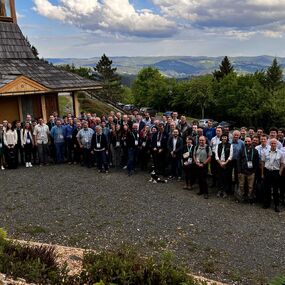Jakub Mareček has been working at the Czech Technical University in Prague since 2020. Within the Faculty of Electrical Engineering he is associated with the Artificial Intelligence Center, where he leads a research group focused on mathematical optimisation. He is a coordinator of the European project entitled Human-Compatible Artificial Intelligence with Guarantees and the principal investigator of several other grants from the European Commission and the Grant Agency of the Czech Republic.
His professional journey is rich with experience in industry and academic research around the world, including IBM Research, ARM Ltd, University of Edinburgh, University of California, University of Toronto, The University of Nottingham. He is the author of many innovative methods and solutions in the areas of power system optimisation, scheduling, quantum computing, and other technologies, as evidenced by his numerous publications and presentations at international conferences.
We had the opportunity to interview Jakub Mareček, one of the invited speakers at the HPCSE 2024 conference organised by IT4Innovations National Supercomputing Center.
Your studies and career are intertwined with computer science. Can you recall what made you interested in computer science so much that you decided to study and pursue a career in it?
Mareček: Like many of my peers, I started out coding simple games in Quick Basic, inspired by the ABC magazine. Then we discovered the ability to use assembly code from Quick Basic, and then Pascal and C. However, Pascal and C didn't really appeal to me until I learned the C++ template library. Then, around 2000, I engaged in promoting the Python language in the Czech Republic.
Do you use supercomputers and quantum computers for your work? Which ones?
Mareček: We use the small cluster at CTU (RCI Cluster) and IBM quantum computers. For IBM, I have contributed to the Qiskit open source package, which also contains a number of simulators.
You have extensive international experience. What do you appreciate most about it?
Mareček: I have fond memories of my time at the IBM research department. What I perceive in retrospect as being positive is
- the absence of " domains": there was no need to distinguish whether something was theoretical computer science, applied mathematics, mathematical physics, or applied physics;
- emphasis on mental hygiene in the sense of focusing on one or two research directions, rather than spanning many directions that often can occur in academia.
At the HPCSE 2024 conference you presented on 'Quantum Optimization: Potential, Challenges, and the Path Forward'. For those who were unable to attend the conference, can you explain what you are currently doing in this area?
Mareček: Quantum computing is still a relatively speculative field. On one hand, it is a field where we cannot rule out exponential speedups compared to classical computing. On the other hand, it is a field the practical application of which presupposes the availability of hardware we do not yet have. So, we are trying to find applications where we can demonstrate the potential benefits of quantum computing first or conversely. These theoretical results would rule out the possibility of exponential speedup.
Quantum optimisation is already the subject of hundreds of academic papers, which we summarise in a review article for Nature Reviews Physics. We also present the best numerical results so far (a paper in the Quantum journal) and the best theoretical guarantees on iterative complexity (another paper in Quantum).
Did you find any particular research presented by other speakers at the HPCSE conference interesting??
Mareček: I have a soft spot for modern C++, and I was pleasantly surprised by how many of the toolkits presented use modern C++. Sometimes, one still thinks more of Fortran in the context of numerical mathematics. If numerical linear algebra comes in C++26, the toolkits will probably still have to change.
What are your impressions of the HPCSE 2024 conference?
Mareček: Although I was talking about computer science in the first question, all my theses are in non-convex optimisation. Non-convex optimisation is impossible to study. Sometimes I think of optimisation as "service statistics", science in the service of other sciences. It is nice to see that supercomputing is much the same way.

